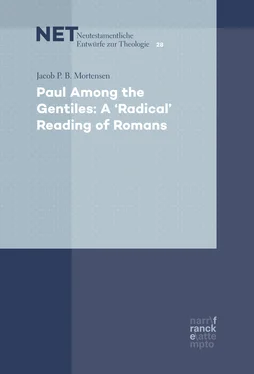Apart from the first-century-relevant rhetorical point concerning the use of προσωποποιία, Stowers notes the cultural ideal of ‘self-control’ (ἐγκράτεια) in this ancient society. According to Stowers, the ideal of self-control is crucial for understanding Romans. This aspect refers to the social background and status of the Gentiles Paul addressed, and their interest in his message. Jews at the time of Paul considered themselves a people characterized by an extraordinary degree of self-restraint, because they had the (Mosaic) law as a means of attaining this goal. And since self-control was such a widely distributed cultural ideal, non-Jews took an interest in Paul’s Jewish message. Thus, Stowers notes that Gentiles may have found it opportune to achieve self-control by way of the (Mosaic) law, and in this way improve their upward social mobility.
The third aspect of Stowers’ interpretation leads to the final key point. If Gentiles in Rome capitalized on the (Mosaic) law in order to boost their upward social mobility, they went too far in their dealings with historical-ethnic Jews.3 According to Stowers, this is why Paul turns to the relationship between Israel and the Gentiles in Romans 9 to 11. Even if God showed mercy to the Gentiles, adopted them as sons, and grafted them onto the stock of Israel, they should not boast in front of their Jewish brothers. The gospel is to the Jew, first, and then also to the Gentile. God never abandoned his covenant with Israel, and that is why Jews and Gentiles have separate but related paths in God’s overall design. In short, Stowers follows Krister Stendahl and Lloyd Gaston with a ‘two covenant’ solution.
Even though I present the radical new perspective as a uniform perspective, such a presentation is misleading. This should be stated explicitly. There are, indeed, rather different scholarly views that aim to move beyond the new perspective. Nevertheless, I find it appropriate to group together those whose scholarly views present themselves as radical and new.1 Beyond their own declaration, there is a didactic point to presenting them together.2 The scholars who ascribe to the radical perspective present considerable diversity with respect to particular details of the interpretation of Paul. However, because of the paradigmatic feature around which these scholars’ research converges, many of them ascribe to the ‘Paul within Judaism’ perspective. Hence, from a didactic and a content-oriented perspective, it makes sense to present them together under an umbrella term, such as ‘the radical perspective’.
The reason for designating the perspective under discussion ‘the radical perspective’ is because their scholarship is mainly indebted to the insights of scholars associated with the new perspective on Paul. These representatives include Krister Stendahl, E.P. Sanders, James D.G. Dunn, G.F. Moore, and W.D. Davies, to name just a few. But another inflow of inspiration follows from the Sonderweg or ‘two covenant’ solution as presented by Lloyd Gaston, John Gager, and possibly Stanley Stowers. However, not all the radicals advocate a ‘two covenant’ solution. Nevertheless, they all operate with a positive picture of Judaism. They all reject the ‘traditional’ Christian characterization of Judaism as ‘works-righteousness’. Furthermore, they all agree that Paul did not create a new religion (Christianity), because he found something fundamentally ‘wrong’ with Judaism. Paul did not create a new religion, and he did not become a ‘Law-free’ apostle.3 Another point pertains to the observation that Paul (and the other apostles) endeavoured to engender a specifically Jewish ‘sect’ or ‘coalition’ or ‘reform movement’. Paul and the other apostles managed minor subgroups of Judaism living a Jewish way of life developed for and by Jews, despite the fact that those who joined these subgroups were, and remained, non-Jews. This meant a Jewish way of life (without being actually Jewish) for Gentiles. The fact that these members remained non-Jews concerns the point that Paul addressed Gentiles, and told them to remain Gentiles. These Gentiles should follow the (Mosaic) law (evident in Paul’s admonitions throughout his letters), but they should not become Jews. That is, these Gentiles should not complete the rite of ethnic conversion signified by circumcision, but they should still somehow conform to the (Mosaic) law and its principles. This point is worth dwelling on, because there is a major difference between upholding the behavioural guidelines operative within Jewish communities, and undergoing an ethnic identity transformation from non-Jew to Jew by way of circumcision. To compare: You may behave like a Catholic (or Jew) without actually being a Catholic (or Jew). And, acting like a Catholic (or Jew) does not actually make you a Catholic (or Jew), even if you present yourself as a ‘better’ Catholic (or Jew) than other Catholics (or Jews), and the whole point is to present the Catholic (or Jewish) way of life as the ‘right one’.
A final point to iterate, concerning the radical new perspective, is the relation of the radical to the new perspective on Paul. According to the radicals, the new perspective is not new enough. The new perspective is still too beholden to traditional (Protestant) theological positions. According to the radicals, new questions regarding Paul should be asked, other courses should be pursued to answer these questions, and the consistency of the answers to these questions remain too related to traditional Christian theologies.4 Hence, in search of a more appropriate paradigm for pursuing research about Paul, they radicalize the new perspective on Paul, in a search for a Paul within Judaism.
Mark Nanos’s work significantly challenges traditional scholarly work on Paul. I specify ‘traditional’, because Nanos did not receive formal doctoral training before writing his first book on Paul. Besides, he worked from an outspoken Jewish perspective, rather than from an ‘objective’ academic one.1 This may mean that he sees things more clearly than traditionally trained scholars, but it may also mean that he misinterprets fundamental Pauline truisms. However, if Nanos’s analyses of Romans and Galatians are correct, his work demands a complete rethinking of these letters, and of our perception of Paul’s missionary work.
In his book, The Mystery of Romans (1996), Nanos addresses three things (primarily): First, he discusses who the ‘weak’ and the ‘strong’ in Rome were (cf. Rom 14:1–15:6).2 Second, he discusses what the ‘mystery’ of Rom 11:25–27 was.3 Third, he discusses who the governing authorities to which Paul refers in Rom 13:1–7 were.4 In each of the three cases, Nanos flips the traditional discussion on its head, and surprises with innovative solutions. According to Nanos, the ‘weak’ of Rom 14:1–15:6 were not Christ-believing Jews. Nanos argues that the ‘weak in faith’ is a respectful reference to the Jews in Rome who did not believe that Christ was the Messiah.5 Paul refers to them as ‘weak’ because they have not yet recognized Jesus as the Messiah, and they do not recognize righteous Gentiles to be co-participants in divine blessing. The mystery of Romans 11 does not concern God’s hidden plan of salvation, but concerns the jealousy of Jews observing Paul’s missionary success with the Gentiles. These non-Christ-believing Jews recognized the eschatological ingathering of the nations, and became jealous, because these other wanted to participate in Israel’s calling to be a light to the nations. Finally, the authorities who should be respected are not Roman imperial powers, but synagogue leaders (Rom 13:1–7). Nanos gathers together these conclusions in the major claim of his book: under the synagogue authority, Christian Gentiles in Rome developed a subgroup identity born of ethnic superiority and Christ-believing Gentile exclusivism.6 Hence, the Jewish ethnocentrism that James Dunn argues is the object of Paul’s criticism of Judaism7 is turned on its head by Nanos, and instead concerns Christ-believing Gentiles’ ethnocentrism and exclusive position, vis-à-vis the Jews before God.
Читать дальше












